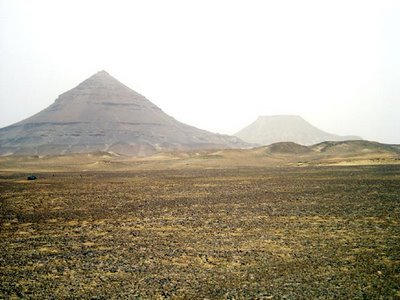
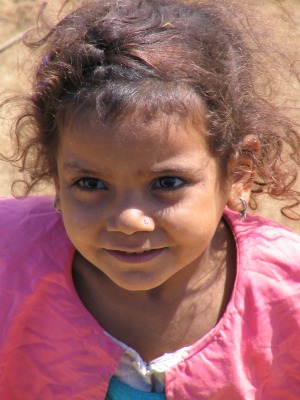

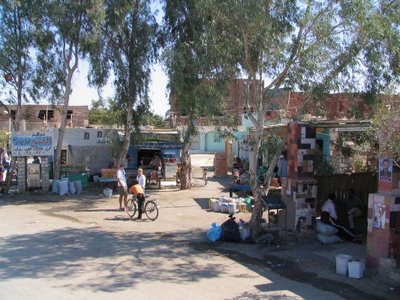
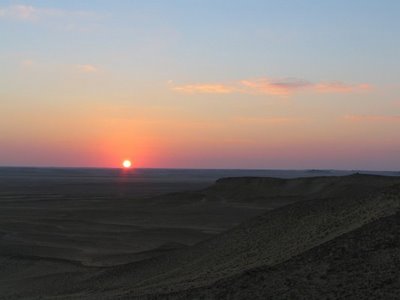

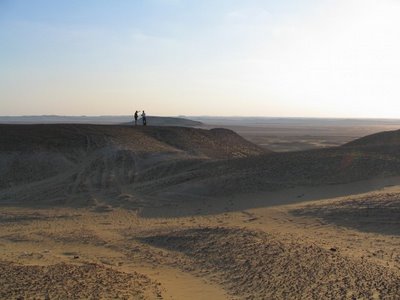


With a desire to get away from the pollution and crowdedness of Cairo and a need for a little"self-time" (living with an Arab family who likes to be around you 24 hours a day and talk in very LOUD voices can be a little exhausting for a quiet independent American like me), I took off for the Bahariyya Oasis (five hours from Cairo in the Western desert) my last weekend in Egypt and spent three lovely, magical days in the desert eating and drinking with different Bedouin families.
I had visited Bahariyya twice before while I was living in Egypt, once with a friend and once with my father, mother, and sister. I was overwhelmed both times by the friendliness and hospitality of the people there, much more genuine than Cairo or any other places I've visited in Egypt. The people there seem to truly enjoy interacting with foreigners and not because they want money or sex. My family remembers the many invites for tea and how when we first got off the bus in Bahariyya, people were calling out "Saara! Saara" remembering me from my first visit.
I decided to try a new environmentally friendly camp"Nature Camp" that was built in the desert (17 km fromthe small town) in 2004 and is owned by Ashruf Lotfe,a famous desert trekker and safari guide. When the packed, run-down bus to Bahariyya arrived an hour later than scheduled, no one from the Nature Camp was waiting for me and after ridding myself of the pesky local boys trying to sell off hotels for commission, I found a driver willing to take me to the camp for 25 pounds. When I arrived, the camp was empty except for one staff boy named Tamer. I was told the owner Ashraf was out of town for the weekend, and apparently there just aren't that many tourists that want to be in the middle of the desert in the Egyptian summer! Crazy me! So I spent the next morning and afternoon sitting in the shade drinking tea, readings books from the small camp library (they actually had a good selection--not just trashy romance novels in French and German) and playing towla (backgammon) with Tamer. Tamer was a sweet boy of 24 who showed off his stained teeth(typical of Egyptians who spend the majority of their time smoking and drinking tea) in a shy grin every time he beat me in a game of Towla! With no other tourists and nothing but the desert around me, the place was peaceful and beautiful but a little TOO quiet. Just was I was thinking I might switch to a hotel near the town for a little more action, two men pulled up in a Toyota Jeep.They immediately pulled out a mat and invited me to sit down for Bedouin tea and introductions. Hany, a smily talkative sort was a local safari guide and he proudly told me his wife was expecting a baby in three months. The other man, Ahmed, was the brother of the owner Ashraf, and according to Hany was newly engaged. As Hany told me this, Ahmed gave a shy smile and as I told him "Alf Mabrouk"--"a thousand blessings on you." I told them about Hamdy and that he used to work at a hotel in the Siwa Oasis, and they said his name sounded familiar and that Ashraf might know him.
That evening Hany and Ahmed said they would take me into town since it was boring for me to stay at the camp by myself. We stopped in the town center first where they bought me some fresh sugar cane juice and then before I knew what was happening, I found myself at Hany's house and he was escorting me into a room where six plump women were seated cross-legged on the floor in a circle. Since it was Friday, there was some sort of Sheika (a female minister of Islam) visiting and she was reciting hadith and the women were discussing it. I awkwardly said "Asalam Alaykum" and sat down in the circle, not sure if Hany always brought foreigners home and how they felt about the fact that my hair was not covered while they were praying and discussing hadith. They seemed not to be bothered, and the religious meeting broke up for a few minutes as they asked me where I was from, what I was doing in Egypt, if I liked Bahariyya, if I was married, if I had children, if my husband was Muslim, if he prayed, if I was Muslim, if I prayed, what I knew about Islam, if I thought I might convert. To the last question, I stuttered "yimkin"-"maybe" only to be polite and because I didn't feel like my Arabic was good enough to explain in a polite and respectful way why I didn't plan to become a Muslim. I should note that these people are Bedouin and speak a different dialect than Cairenes, adding to some of the language difficulty. They seemed pleased with me though, particularly with what I was wearing. (I was dressed fairly conservatively and they are used to seeing foreigners wearing tank tops and shorts which is a big NO-NO in the countryside) Soon, the Sheikha and her mother left, and Hany's sister "Naa'ma" took me into her bedroom and started playing some local music and dancing. She urged me to dance with her and although I've actually been taking belly dance classes for a year, I knew that I wasn't near as good as her. I started to move a little until the rest of the family came in to watch and then I was WAY too embarrassed. Fortunately, Hany came back in around this time and saved me from making a greater fool of myself.
I spent much of the next two days hanging out with Hany's family. I got dragged on a hike with all the male cousins under 12 years old, embarrassed myself with more belly dancing, and chatted for hours with Na'ama like we were sisters at heart. She was funny, smily and outgoing--20 years old, not yet married, and worked in the local Museum. She was also not very attractive-round and plump as a turkey--which, according to her, Bahariyyan men have no problem with--"skinny or fat, a woman is a woman." We spent Saturday evening sitting on the roof (more air up there in the summer) and talked about love and marriage. She told me in confidence about her secret "relationship" with a police man from Alexandria that works in the Museum. Apparently he has only seen her eyes (she wears the black Naqab while outside the house) but that was enough for him. They stole glances and quick flirtations with each other at the museum and she secretly talked to him on her mobile. When I asked her if she would marry him, she said her father would never approve since he lived outside of Bahariyya. "And what if he moved to Bahariyya?" I asked. "I don't know, maybe, it's complicated" she responded. She joked that she preferred to marry a foreigner and would marry my brother, since he was single. She preceded to practice saying "Nay t-th-an"over and over. I couldn't help but laugh as I imagined my shorter, slender, intellectual brother with this plump, talkative Bedouin girl. She was sure my brother was very handsome, and I promised to send her a picture of him.
The food in Hany's house was absolutely amazing--the best food I have eaten in Egypt. A typical meal consisted of overflowing shared plates of dark rice, grilled chicken, potatoes in tomato sauce, salad with lots of spicy watercress, a slimy delicious okra soup, mulakheyya (another slimy vegetable known in English as "Jew's mellow") and a thick wheaty homemade bread that I haven't eaten anywhere else in Egypt. Delicious! That's not to mention the endless rounds of fruits and drinks offered to me--dates, figs, grapes, mint tea, nescafe, fresh lemon and strawberry juice...
My last evening in Bahariyya Hany and Ahmed took me out into the desert with their jeep and we lay some mats down and talked and star gazed for over two hours. I soaked in the silence of the desert and gazed in wonder at the countless white specks in the sky(not visible from the lights and cloud of pollution inCairo). Hany asked me if I could count the stars and when I said no, he joked that his Asian tourists always try to count the stars "won, too, threee, foor"and then he made a very comical gesture of them bowing and taking pictures. I laughed despite the ridiculous stereotyping. The fresh night desert air was too refreshing, too relaxing, to be anything but overwhelmingly happy. On Sunday, Ashraf (the owner of Nature Camp) had returned and insisted that I have lunch with his family before taking off for Cairo. Before we arrived at his house, Hany told me how Ashraf was famous in the area and everyone knew him and respected him because even though he worked with foreigners, he was very religious and never strayed from the straight and narrow. And at the same time, he loved to laugh and treated his kids well. A handsome rugged man in his 40s wearing a long white and gold galibayya (robe) opened the door and I knew this must be Ashraf. He spoke English very well and I realized it was the first time I had heard or spoken English all weekend.(points for me!) I had another amazing meal and spent some time playing with his children "SaraaH"-5 yearsold, and "Ziad" 1 1/2 years old---the CUTEST kids ever.
My last conversation with Hany before getting on the bus included him telling me that if their expected child turned out to be girl, he would name her Sara, after me. I told him jokingly that he was a liar, and he swore that he would. "After all", he said, "I can't name my girl Cindy or Katherine, but Sara is a common name around here--no problem." I told him I would call him in three months and check up on it. I should add that I also had a conversation with Hany about what is happening in Israel and Lebanon, and he commented about how the people in Bahariyya like peace and are more interested in drinking, eating, laughing, enjoying their children and family, making new friends, than making war. He said that Bahariyyans love everyone, even Israel. My ears perked up at that last statement. It was the first time I had heard "I love Israel" from the lips of an Arab. I asked him for clarification. "You love Israel?" And in simple words that hold more wisdom than any of our leaders today, he went on to say that there are good and bad people everywhere and we can't just say Israel is evil or Iran is evil. A country is not one leader or one entity, but many, and the world would be a better place if we viewed countries more as many individuals than collective identities. I nodded in agreement, and thought, Listen up George Bush! Listen up Tony Blair!
As my bus finally rolled back into Cairo, and the exhaust fumes hit my nose and the blaring of car horns filled my years, I longed to go back to the desert,but I knew Hamdy's family would be waiting for me. The bus driver, not wanting to waste time by bringing us back to the bus station as he was supposed to do, dropped us all off on a random street. I had no idea where I was, but thank God for the hundreds of black and white 1970s taxis that wiz by every two seconds. I made my way through the mass of people to the edge of the street, stuck out my hand, yelled "Medinet Nasr"as a taxi drove up, and jumped in. For a moment, as I watched the other tourists that were on the bus flounder about, wondering where they were and what to do, I felt proud that I could speak Arabic and knew how to survive in this city of millions.
Before I fell asleep that night I got a phone call from Hany, asking if I made it to Cairo all right. I thanked him for the weekend and told him to say hello to his family and Ahmed. So far, he or one of his family members has called me every night this week.
My weekend in the desert reminded me about why I fell in love with the Arab world in the first place. And maybe it is what made me fall in love with Hamdy too!:-) (we met in an even more remote desert Oasis) It is a magical place where strangers quickly become friends and where a night of star gazing is certain to heal a tired, stressed out soul...









